What Colors Do You Mix for Purple
There are so many different shades of purple! Knowing how to best make purple and what colors to mix to create it, is an absolute must for painters! Whether you are using it to add a vibrant accent or for creating shadow values in your painting, its usefulness can't be understated.
First, we will take a look at what colors make purple when mixed together. Then I will show you how to make different shades of purple. So that you can create any purple color you may need – let's get into it!
Contents
- 1 What two colors make purple?
- 2 How to make shades of purple
- 2.1 Mixing blue and red
- 3 What colors to mix to make purple muted
- 3.1 How to mix muted colors using complementary colors
- 3.2 Mixing purple and yellow to make muted shades of purple
- 4 How to make dark purple color
- 5 How to make light shades of purple
- 5.1 Mixing purple with white
- 5.2 How to make light purple with yellow
- 6 What colors mixed together make purple cooler in value
- 7 How to mix a warm purple color
- 7.1 Red and purple mixed
- 8 How to mix earth tone shades of purple color
- 9 Examples of different shades of purple in art
- 9.1 Edwin Dickinson
- 9.2 Paul Cézanne
- 9.3 Johannes Vermeer
- 10 How to use shades of purple color in your own painting
What two colors make purple?
So, what colors make purple? As purple is a secondary color, the primary colors red and blue make purple when mixed together. However, there are many other colors you can use (including different shades of blue and red) to create different shades of purple color.
Take a look below to see what additional colors you can use to make shades of purple…
How to make shades of purple
Overall, Ultramarine Blue makes a dark purple, while purple mixed with Cobalt Blue will create a lighter shade of purple. Purple mixed with Alizarin Crimson, will also be a little cooler in color temperature, than if you create a purple with blue and Cadmium Red. You can also mix purples with other varieties of reds than mentioned here such as Burnt Siena, Quinacridone Red, and Vermillion.
Mixing blue and red
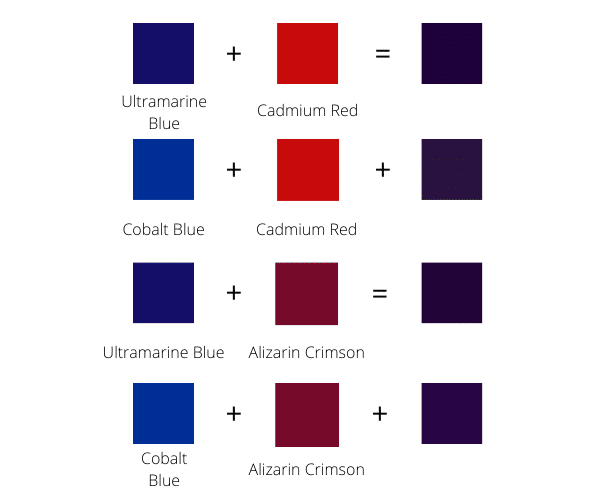
When learning how to make the color purple, you can also use different types of blues such as Pthalo Blue, Prussian Blue or Cerulean Blue. However, if you do not have any of these colors on hand. Simply use the blue and red colors that you have to make purple.
What colors to mix to make purple muted
You may not always want to have a bright, saturated purple. Muted colors are a very important aspect to any painting as they are what make bright colors to stand out. So knowing what colors make purple muted, allows you to create different shades and combinations of muted colors.
How to mix muted colors using complementary colors
Muted colors are created by mixing a color with its complementary color. Take a look at the color wheel below. The colors that are opposite each other are the complementary colors. So, for example, yellow is the complementary color of purple and red is the complementary color of green.
So, since yellow is the complementary color of purple (and vice versa) we will mix purple with yellow to get a muted purple color. Below you will see different combinations of purple and yellow that you can mix together. In order to achieve various shades of purple colors that are muted. Here we reference the complementary color wheel but there are many variations in the color wheel for artists and it is well worth learning and understanding its nuances.
Mixing purple and yellow to make muted shades of purple

When mixing Yellow Ochre with either Provence Violet Bluish or Dioxazine Purple you get more of an earth tone purple than when it is mixed with Cadmium Yellow. And of course the muted purple that is made with Provence Violet Bluish ends up being lighter than if mixed with Dioxazine Purple.
You are not limited to the colors mentioned in the color chart for creating a muted purple. You can use different shades of purple that you mix up yourself and then mix those with any yellow you choose. Other options for yellows are Cadmium Lemon Yellow, Hansa Yellow, and or whichever other yellow you might have on hand.
If you haven't already – you can grab my FREE Color Mixing Guide for helpful color mixing instructions and techniques!
How to make dark purple color
Purples can make really great dark colors because they are generally already a darker color. However, there are great ways for how to make the color purple even darker shades of purple! The color chart below shows what colors make purple darker by mixing them with other colors that are dark in value.
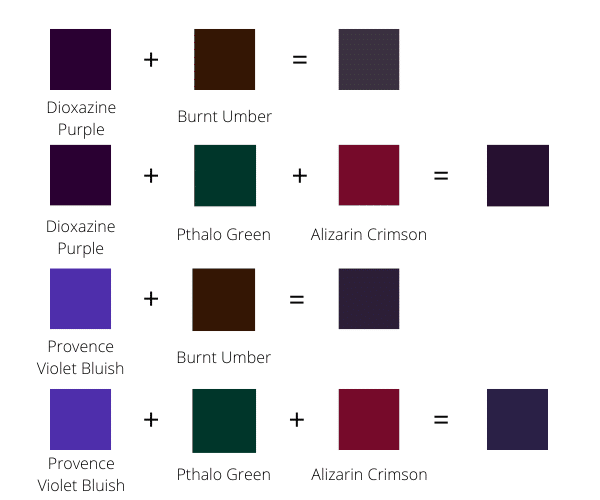
Burnt umber mixed with purple creates a nice muted dark purple color. It also makes the purple a bit warmer as burnt umber is warmer in temperature than purple. Pthalo Green mixed with Alizarin Crimson makes a dark black color. So when you mix this color mixture with purple then you end up with a very dark purple color. This is probably one of the darkest purple colors you can mix up for yourself!
Next, you can also mix dark shades of purple using Provence Violet Bluish or any other lighter purple color. Though keep in mind that when using Provence Violet Bluish you will end up with a lighter purple than Dioxazine Purple. However, you can still make a dark purple color with it as seen in the color chart.
How to make light shades of purple
As mentioned before, many purples are darker in value. So, you will undoubtedly run into circumstances when you will need to know how to make the color purple a lighter shade of purple yourself. The obvious color you would mix with purple to lighten it would be white. You can see the difference between both Dioxazine Purple and Provence Violet Bluish when mixing them both with white.
Mixing purple with white
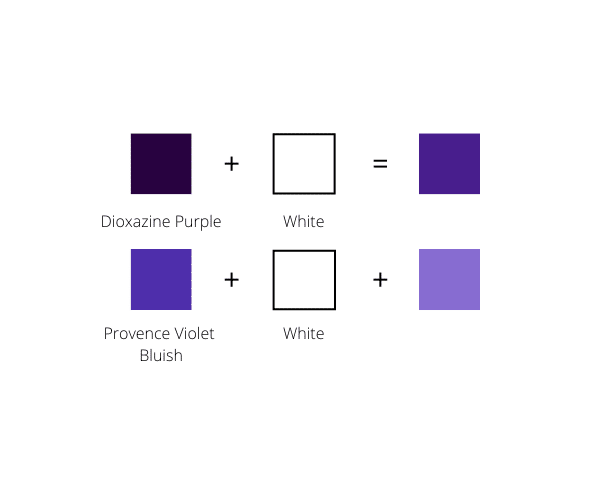
How to make light purple with yellow
To make a color lighter you simply need to mix it with a color that is lighter in value. So, there is another reasonable option for lightening purple besides just white. That color would be yellow. Now, yellow can also be used to mute purple as explained above. However, when mixing purple with a light yellow it will also lighten the purple. So, this mixture can be helpful if you need to lighten and mute a purple.
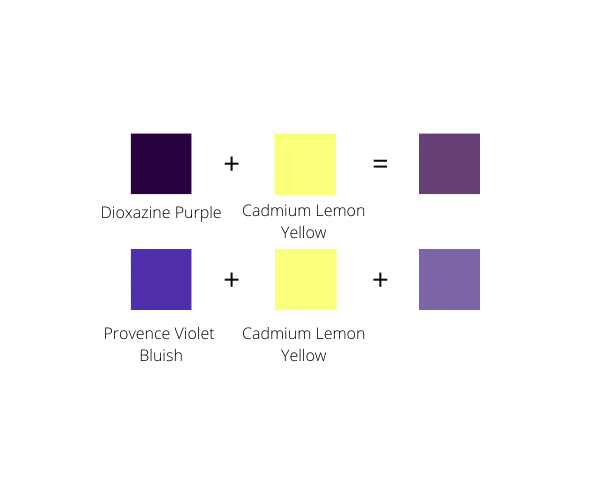
In the color chart example above Cadmium Lemon Yellow is used to lighten purple. This is a much lighter version of yellow when compared to Cadmium Yellow. You can also use Cadmium Yellow to lighten purple with – however it will not turn out as light as when mixed with Cadmium Lemon Yellow.
What colors mixed together make purple cooler in value
Paying attention to color temperature is absolutely essential when painting. It is one of the most important things to consider when you mix your colors. So what colors make purple cooler? Well, blue is one of the best colors to mix into your purple when you need to create a cool purple.
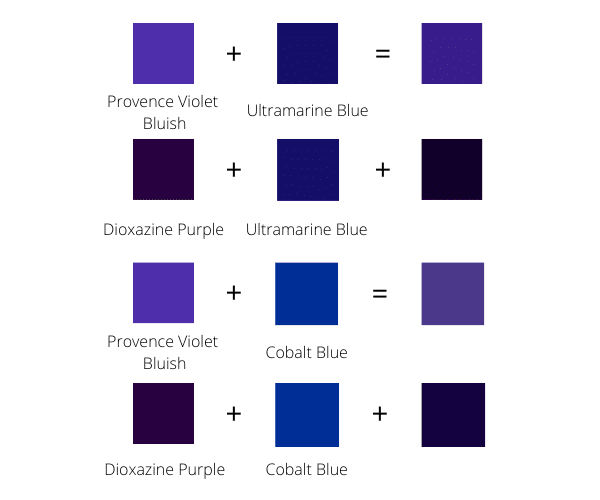
You can see in the color chart above how both the Provence Violet Bluish and Dioxazine Purple react to being mixed with Cobalt Blue and Ultramarine Blue.
How to mix a warm purple color
Being able to mix a warm purple is just as important as mixing a cool purple.
Red and purple mixed
In the color chart below I used two different kinds of reds – Alizarin Crimson and Cadmium Red. The Alizarin Crimson is cooler in temperature (and darker) while the Cadmium Red is warmer.
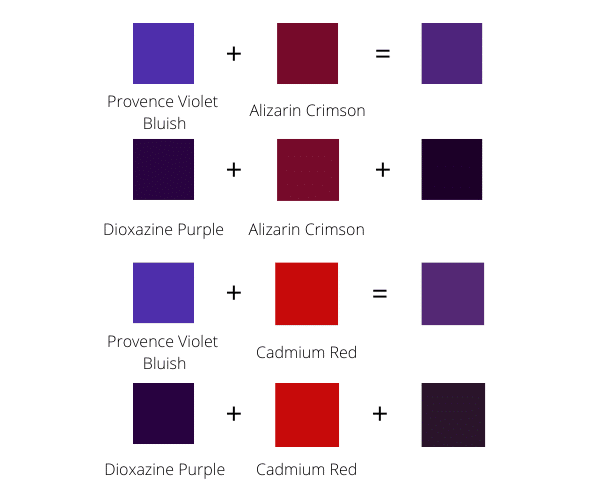
Alizarin Crimson mixed with purple ends up being a little darker than when mixed with Cadmium Red. And as expected, a red mixed with Alizarin Crimson would be cooler in temperature.
How to mix earth tone shades of purple color
Do you like earth tone colors? They can make great shades of purple and are an alternative way to mix more muted purples, outside of mixing purple with its complementary color yellow. In the color chart below you can see that Blue (Cobalt Blue and Ultramarine Blue) can be mixed with Burnt Siena to create a purple. However, just mixing blue with Burnt Siena alone does not create a strong enough purple. So, I recommend mixing in a little bit of Alizarin Crimson or Cadmium red.
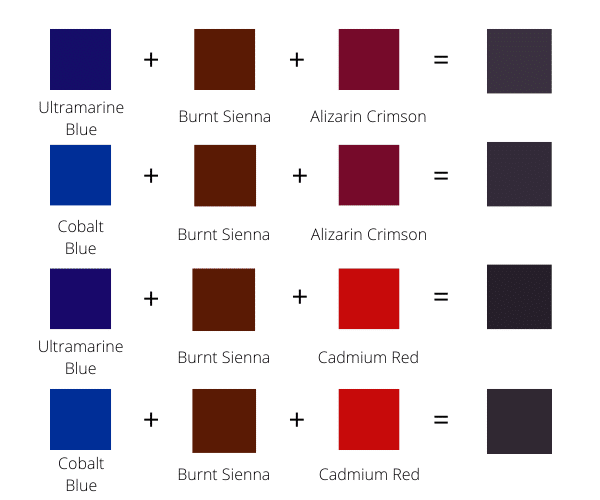
Examples of different shades of purple in art
Now that we have covered the practical side of how to mix different shades of purple it is time to look at the color purple at work in art. In the paintings below you will see how different shades of purple help to serve different roles. Muted purples can act as shadows while bright purples can be highlights.
Edwin Dickinson
Here is a painting by the American painter Edwin Dickinson. It contains a range of muted colors. In fact, Dickinson would often use the color purple in his paintings.
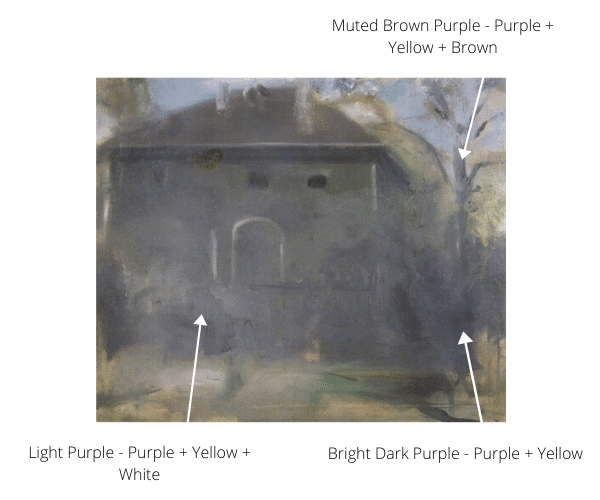
There is a strip of dark purple on the lower right side of the painting – it is a dark bright purple and helps for the foreground to feel like it is in front. In addition, the tree on the upper right side of the painting is made with a lighter muted purple.
Paul Cézanne
Paul Cézanne was a French 19th century painter whose work influenced many artists in the 20th century. This particular fruit still life painting of his has many different shades of purple in it.
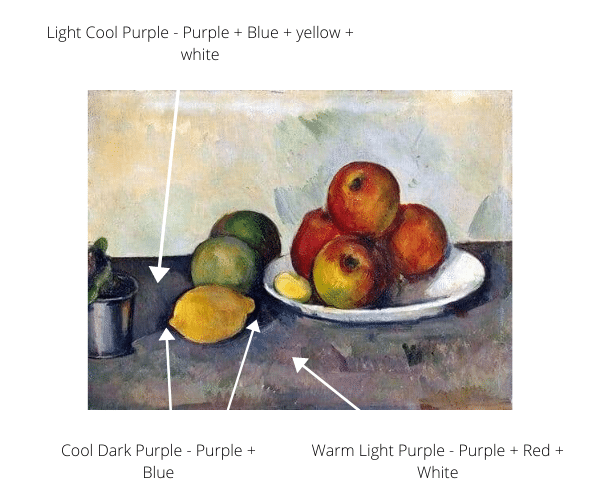
The artist used dark muted purple under the lemon as well as underneath the plate to denote shadows. He mixed a cool purple for the area that is behind the lemon. Having a cool purple in this area works well as cool colors recede back in space while warm colors move forward. On that note, he used shades of warm purple for the foreground area of the painting as you can see in the front center area of the work.
Johannes Vermeer
I am showing a painting by one of the old masters to prove that they too used the color purple! This painting by Vermeer is an example of how muted purple can play a strong role in a painting. Most of the wall in the background is made of different shades of muted purple. The color scheme works very well as Vermeer uses a complementary color palette. Since the girl in the painting is dressed in yellow and the background is in purple the painting provides a beautiful Purple – Yellow complementary color scheme.
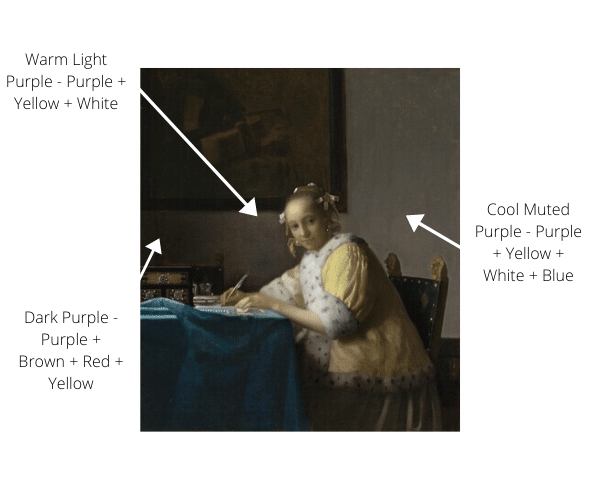
The right side of the painting is a cool muted purple, though lighter than the other side of the wall. The lower far left side of the wall is much darker and slightly warmer than the right side. However, there are patches of lighter areas on the left side of the wall as seen by the middle arrow.
How to use shades of purple color in your own painting
Purple has many uses beyond just using the color to paint areas of purple in your painting. It is very helpful to mix into all sorts of other colors as well, even if that color is not meant to look purple. In fact you can mix a really nice shade of brown color using purple. Often just adding a small amount of purple can help to create a rich and complex color.
It is important to always keep an open mind when it comes to combining and mixing colors – it is often the least expected color combinations that leads you to the best colors!
More color mixing guide resources for you:
- How to make the color brown
- What colors make orange when mixed together?
- How to make different shades of green color
Want to remember this? Save How to Mix Shades of Purple Color to your favorite Pinterest board!
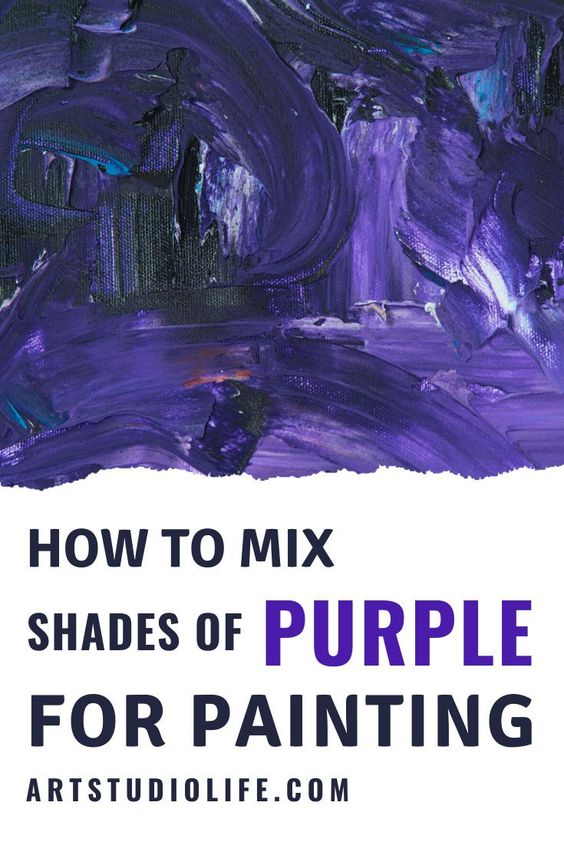
What Colors Do You Mix for Purple
Source: https://artstudiolife.com/shades-of-purple/